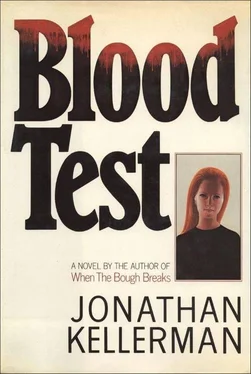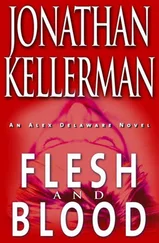Jonathan Kellerman - Blood Test
Здесь есть возможность читать онлайн «Jonathan Kellerman - Blood Test» весь текст электронной книги совершенно бесплатно (целиком полную версию без сокращений). В некоторых случаях можно слушать аудио, скачать через торрент в формате fb2 и присутствует краткое содержание. Город: New York, Год выпуска: 1986, ISBN: 1986, Издательство: Atheneum, Жанр: Триллер, на английском языке. Описание произведения, (предисловие) а так же отзывы посетителей доступны на портале библиотеки ЛибКат.
- Название:Blood Test
- Автор:
- Издательство:Atheneum
- Жанр:
- Год:1986
- Город:New York
- ISBN:978-0689116346
- Рейтинг книги:4 / 5. Голосов: 1
-
Избранное:Добавить в избранное
- Отзывы:
-
Ваша оценка:
- 80
- 1
- 2
- 3
- 4
- 5
Blood Test: краткое содержание, описание и аннотация
Предлагаем к чтению аннотацию, описание, краткое содержание или предисловие (зависит от того, что написал сам автор книги «Blood Test»). Если вы не нашли необходимую информацию о книге — напишите в комментариях, мы постараемся отыскать её.
Blood Test — читать онлайн бесплатно полную книгу (весь текст) целиком
Ниже представлен текст книги, разбитый по страницам. Система сохранения места последней прочитанной страницы, позволяет с удобством читать онлайн бесплатно книгу «Blood Test», без необходимости каждый раз заново искать на чём Вы остановились. Поставьте закладку, и сможете в любой момент перейти на страницу, на которой закончили чтение.
Интервал:
Закладка:
He spent half an hour in the cell. I tried to kill the time by reading a magazine for highway patrolmen until I found that it specialized in graphic photoessays of fatal road wrecks accompanied by detailed descriptions of the vehicular horrors. I couldn’t imagine why those who witnessed such carnage as part of their daily routine would be attracted to a photographic reprise. Perhaps it provided distance — the true solace of the voyeur. I put the magazine aside and contented myself with watching W. Bragdon read about alfalfa culture while he picked at his cuticles.
Finally a buzzer rang.
“Go in and get him, Walt,” ordered Houten.
Bragdon said yessir, left, and came back with Maimon.
“I think,” said the attorney, “we may be able to reach a compromise.”
“Run it by me, Ezra.”
The three of us sat around one of the desks.
“Dr. Melendez-Lynch is a very intelligent man,” said Maimon. “Perhaps overly persistent. But not, in my opinion, at all malicious.”
“He’s a pain in the butt, Ezra.”
“He’s been a little overzealous in his attempts at fulfilling his medical obligations. But, as we all know, Woody’s deathly ill. Dr. Melendez-Lynch feels he has the means to cure him and he sees himself as trying to save a life.”
Maimon spoke with quiet authority. He could have acted as Houten’s mouthpiece but instead seemed to be functioning as a true advocate. I didn’t think it was for my benefit and I was impressed.
Houten’s face darkened with anger.
“The boy’s not here. You know that as well as I do.”
“My client is an empiricist. He wants to see that for himself.”
“No way is he going near that place, Ezra.”
“I agree with you. That would be inviting trouble. However he did agree to Dr. Delaware’s conducting a search of the Retreat. Promised to pay his fines and leave without a fuss if the good doctor finds nothing suspicious.”
It was a simple solution. But neither Houten nor I had come up with it. He, because his appetite for concession wasn’t hearty in the first place and he’d already had his fill. And I’d been too overwhelmed by Raoul’s fanaticism to think straight.
The sheriff digested it.
“I can’t force Matthias to open the place up.”
“Of course not. He has every right to refuse. If he does we’ll reapproach the problem.”
An eminently logical man.
Houten turned his attention to me.
“What about it? You up for it?”
“Sure. Whatever works.”
Houten went into his office and returned saying Matthias had okayed the visit. Maimon had another talk with Raoul, buzzed, was retrieved by Bragdon and left, telling the sheriff to call him if he was needed. Houten put on his hat and absently touched the butt of his Colt. He and I climbed down the stairs and out of the building. We got into a white El Camino decaled on the door with the sheriff’s star. He gunned the engine, which sounded super-charged, and turned right in front of city hall.
The road forked a half mile out of town. Houten headed right, driving quickly and smoothly, accelerating around turns that would have given a stranger pause. The road narrowed and grew dim in the shadows of bordering conifers. The El Camino’s tires churned up dust as it sped past. A jackrabbit in our path froze, quivered, and bounded into the shelter of the tall trees.
Houten managed to pull out a Chesterfield and light it without reducing speed. He drove another two miles, sucking in smoke and surveying the countryside with a cop’s scanning eyes. At the top of a rise he turned abruptly, drove a hundred feet, and braked to a stop in front of a pair of black-painted arched iron gates.
The entrance to the Retreat was unlabeled as such. Prickly mounds of cactus squatted at the outer edges of both gates. A tide of electric pink bougainvillaea flowed over one of the abode gateposts. A single climbing rosebush awash with scarlet blooms and studded with thorns embraced the other. He turned off the engine and we were greeted by silence. And all around, the deep, secretive green of the forest.
Houten stubbed out his cigarette, dismounted the truck, and strode up to the entrance. There was a large columnar lockbox affixed to one gate, but when he pushed the iron door, it swung open.
“They like it quiet,” he said. “We’ll walk from here.”
An unpaved path lined with smooth brown stones and meticulously barbered beds of succulents had been excised from the forest. It climbed and we moved briskly, the pace set by Houten. He hiked rather than walked, muscles swelling through the tautness of his slacks, arms swinging by his sides, military fashion. California jays squawked and fussed. Large fuzzy bees nuzzled up to the labia of wildflowers. The air smelled meadow-fresh.
The sun bore down relentlessly on the unshaded path. My throat was dry and I felt the sweat trickle down my back. Houten seemed as crisp as ever. Ten minutes of walking brought us to the top of the road.
“That’s it,” said Houten. He stopped to pull out another cigarette and light it in the shelter of cupped hands. I mopped my brow and gazed down at the valley below.
I saw perfection and it unnerved me.
The Retreat still looked like a monastery, with its towering cathedral and high walls. An assortment of smaller buildings sat behind the walls and created a maze of courtyards. A large wooden crucifix topped the belfry of the churchtower, a brand burned into the azure flanks of the sky. The front windows were leaded and supported by wooden balconies. The roofs and the tops of the walls were layered with red clay tile. The walls were fresh vanilla stucco splashed dove white where the sun hit. A great deal of care had been taken to preserve the intricate moldings and borders scored into the stucco.
A running brook circled the compound like a moat. Above it floated an arched viaduct that bled into a brick pathway at the point where solid ground reasserted itself. The path was hooded by a stone arbor caressed by tendrils of grape vine, ruby clusters of fruit ponderous amid the green leaves.
To the front of the compound was a small patch of lawn shaded by ancient gnarled oaks. The big twisted trees danced like witches around a fountain that spat into an enormous stone urn. Beyond the buildings were acres of farmland. I made out corn, cucumbers, groves of citrus and olive, a sheep pasture and vineyards, but there was plenty more. A handful of white-garbed figures worked the land. Heavy machinery buzzed wasplike in the distance.
“Pretty, isn’t it?” asked Houten resuming the hike.
“Beautiful. Like out of another time.”
He nodded. “When I was a kid I used to climb around the hills, try to get a peek at the monks — they wore heavy brown robes no matter how hot it got. Never talked to anyone or had anything to do with folks in town. The gates were always locked.”
“Must have been nice growing up here.”
“Why’s that?”
I shrugged.
“The open air, the freedom.”
“Freedom, huh?” His smile was abrupt and bitter. “Farming is just another word for bondage.”
His jaw set and he kicked at a rock with sudden savagery. I’d hit some kind of nerve and quickly changed the subject.
“When did the monks leave?”
He sucked on his cigarette before answering.
“Seven years ago. The land went fallow. Scrub and brambles. Couple corporations thought of buying it — executive resort and all that — but all of ‘em backed out. The buildings weren’t suited to it — rooms like cells, no heat, looked like a church any way you cut it. The cost of renovation would have been too high.”
“But perfect for the Touch.”
He shrugged.
“Something for everyone in this world.”
The front door was rounded at the top, a slab of stout boards braced by wide iron bands. Inside was a three-story white-walled entrance floored with Mexican pavers and skylit from above. A smear of color reflected from the stained-glass windows rainbowed the tiles. The spicy aroma of incense suggested itself. The air was cool, almost to the point of refrigeration.
Читать дальшеИнтервал:
Закладка:
Похожие книги на «Blood Test»
Представляем Вашему вниманию похожие книги на «Blood Test» списком для выбора. Мы отобрали схожую по названию и смыслу литературу в надежде предоставить читателям больше вариантов отыскать новые, интересные, ещё непрочитанные произведения.
Обсуждение, отзывы о книге «Blood Test» и просто собственные мнения читателей. Оставьте ваши комментарии, напишите, что Вы думаете о произведении, его смысле или главных героях. Укажите что конкретно понравилось, а что нет, и почему Вы так считаете.












